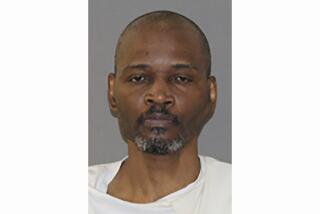High Court Upholds Death Sentence for Long Beach Killing
- Share via
SAN FRANCISCO — A narrowly divided state Supreme Court on Monday upheld the death sentence of the convicted killer of a Long Beach woman who ran to the aid of her son after he was shot during a 1983 robbery.
The court agreed that the prosecution, in seeking the death penalty, had improperly presented the jury with evidence of criminal but nonviolent conduct by the defendant, Andre Burton, when he was a juvenile.
But by a 4-3 vote, the justices said any harm to Burton was far outweighed by evidence of his past conduct that was admissible, including the commission of burglary and attempted robbery.
“The jury also had before it the circumstances of the murder--a cold-blooded shooting of a defenseless, 93-pound, 4-foot-11 . . . elderly woman immediately after the defendant twice shot in the face, at point-blank range, his third robbery victim (her son),” Justice Edward A. Panelli wrote for the majority.
The court’s three dissenters, in an opinion by Justice Allen E. Broussard, said that while Burton’s conviction should be upheld, his sentence to death should be overturned because the jury was likely influenced by the improperly admitted parts of his juvenile record, including lewd conduct as a child.
‘Failed to Profit’
“Evidence was erroneously admitted which painted the defendant as a depraved youth who had failed to profit from earlier efforts at rehabilitation,” Broussard wrote. “. . . It is not only reasonably possible but probable that these errors affected the verdict.”
State Deputy Atty. Gen. Robert F. Katz said the ruling represented “a just result” in the case.
“The mother was shot while running up to give assistance,” he noted. “The two senseless shootings probably motivated the jury’s verdict.”
The attorney representing Burton on appeal, Samuel Jackson of Santa Monica, declined comment.
The decision marked the 52nd time the justices have upheld a death sentence in 75 capital rulings issued since conservatives gained control of the court after the defeat of Chief Justice Rose Elizabeth Bird and two other court members in the November, 1986, election.
Under Bird’s tenure, the court upheld the death penalty in only four of 68 cases.
Burton, now 26, was charged with the murder of Gulshakar Khwaja and the severe wounding of her son, Anwar Khwaja, a convenience store owner, during the second of two robberies he committed with an accomplice in February, 1983.
Followed to Home
Authorities said that after robbing two women earlier at gunpoint, Burton, then 19, and the accomplice followed Anwar Khwaja and his 9-year-old daughter to his mother’s home after the store owner had picked up a bag containing $190 in rolled coins from a bank.
Anwar Khwaja later testified that Burton approached the car with a gun and demanded money. Khwaja told him to take the money bag, but, nonetheless, the assailant shot him twice in the forehead, with one bullet passing through his eye. The store owner, severely wounded but still able to see, said then that Burton took the money bag and, smiling or laughing, fatally shot Khwaja’s mother as she came running to the scene in a futile bid to help her son.
Later, police took Burton into custody and, according to police, he first admitted the shootings, saying he had fired at both Khwaja and his mother when they had “snatched” at him during the robbery. Burton later recanted the admissions.
At trial in Los Angeles Superior Court, Burton was convicted of the murder of Gulshakar Khwaja and three counts of robbery. In the penalty phase of the proceeding, the prosecution, citing Burton’s criminal background, called a Juvenile Court official who testified that as a youth, Burton had committed a lewd act with a 4-year-old, attempted a robbery, attempted grand theft and a burglary.
Burton’s mother, presenting mitigating evidence in her son’s behalf, testified that Burton’s father had been murdered when the boy was 5 years old. Burton, one of eight children living on welfare, had “been good” at home, occasionally attending church, but had begun having trouble because of fighting at school, his mother said.
The jury eventually returned a verdict of death, and Burton’s case came to the justices on automatic appeal. In Monday’s ruling, the court majority said it was proper for the prosecution to introduce juvenile record evidence of attempted robbery--a violent crime--but that the state’s death penalty law barred introduction of the other, nonviolent acts Burton committed as a youth.
More to Read
Sign up for Essential California
The most important California stories and recommendations in your inbox every morning.
You may occasionally receive promotional content from the Los Angeles Times.









